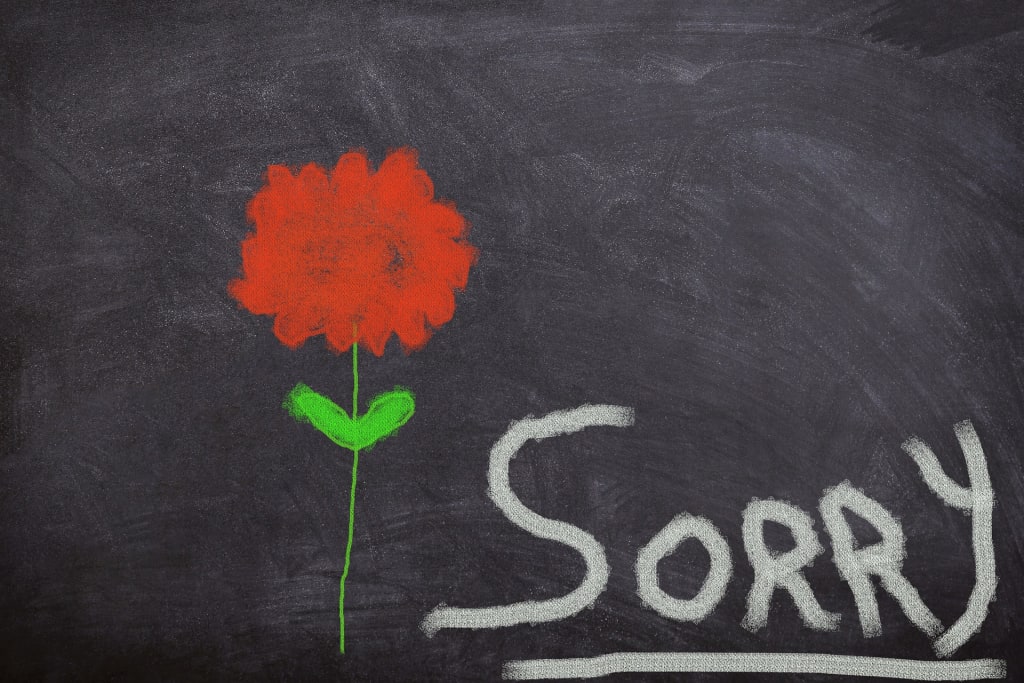How To Deal With Fake Apologies and a Seemingly Negligent Partner
What difference does an apology make?

‘You’re not listening!’ she almost shouts at him. The previous calm has abandoned her body, and she’s starting to boil with rage inside. The same thing is happening all over again.
‘It’s nothing. I don’t know what you get yourself all worked up about,’ he says in forced neutrality with a covertly supercilious undertone. Something that makes her blood boil even more. Calm down, calm down, calm down, she tries to tell herself.
‘Ok, ok, I’m sorry you feel that way. Let’s forget about it,’ he goes on saying.
The apology is, of course, completely insincere. She knows he just wants to end the conflict and do something more gratifying. Sometimes, she’s amazed by how little he thinks. He who seemed so insightful and full of wisdom at the beginning.
He wants to feel good now. But she wants to resolve this thing from the heart of the matter. Partly so that it doesn’t repeat itself, and they can actually become better at communicating. Partly so that the gnawing tension inside can be released (and not turn into a knot of resentment). Both of these factors will make them connect on a deeper level. She knows. And he knows somewhere deep down too, but he seems to keep forgetting.
She’s seen it all too many times, people growing cold in their relationships. People not resolving their shit; people not apologizing [sincerely]; people clinging to their pride and need to be right; people being impatient and wanting an easy, conflict-free life. And then, over time, they can’t talk about very much anymore. They need to avoid a number of topics and they’ll display a growing preference for mobile attention over presence with one another. Besides that, there’s that underlying resentment that pops up oh-so-discreetly every once in a while. Of course, she’s experienced all this too. (She’s ‘people’ too.)
No, not again, she thinks for herself. Why is the same story running on repeat?
‘Don’t apologize if you don’t mean it, please,’ she tells him while trying to keep her exasperation in check.

Human communication goes way beyond the words we use
An apology is not only expressed by the literal words, ‘I’m sorry.’ It matters how we say these words. The implicit cues we give off are often more telling than the explicit words we use.
As most people know (but tend to forget), the main way we communicate is nonverbal: that is to say, with our body language, posture, gestures, facial expression, tone of voice, and eye contact.
Just the fact that the human eye has an unusually large white part, sclera, compared with other animals is telling. The focus of our eyes is given away by the position of the eyeball in the sclera: thus where our attention is directed is rather conspicuous. Humans communicate extensively with their eyes.
All these nonverbal ways of communicating are processed rather intuitively. Sometimes when we interact, we don’t know why some people make us feel more relaxed while in the presence of others, we feel instantly tense and slightly anxious. And to articulate why this is — is hard.
When you find that something ‘just doesn’t feel right’ or that someone’s words don’t seem congruent somehow — but you can’t put your finger on exactly what’s wrong — the best thing to do might be to step back and pause for a bit. Otherwise, the risk is that you get angry and make a fool out of yourself for lacking the ability to express what you perceive, and that may be used against you. (It’s no fun — speaking from experience!)
Though some things can seem so small and inconsequential. (Like a loved one saying, ‘I’m sorry you feel that way.’) Why not just let it go and forget about it? And not be so hysterical about every little thing. Be easygoing.
There’s something to that. The ability to let go and forgive is, indeed, great. But so is the ability to have a sense of self-worth, and clarity of what’s acceptable and what’s not. To stand on your dignity, in other words. And how can you love and respect someone else if you don’t respect yourself?
An insincere apology instills distrust
To take the example from above, ‘I’m sorry you feel that way,’ is not really an apology. Though it may seem like a petty detail to get all worked up about. It’s subtle, but the direction of culpability is actually towards his partner, who might be overtly or covertly addressed as ‘overly sensitive’ for feeling such a way. The undercurrent tells us there’s something wrong with her. He’s sorry she feels that way, but he’s not sorry he acted that way. This is not a constructive or healthy way of communicating.
Perhaps he’s just a selfish pig, or perhaps he’s simply not aware of it and needs some guidance so that he can address his own non-constructive way of communicating. (After all, we all have our flaws, don’t we?) But we won’t know until we — calmly and kindly — address it. It stands the best chance of a positive outcome if it’s done with a good faith intention and belief in our partner.
Though if not addressed, how can you tell if your partner really is sincere in his apology or not when it happens the next time and then the time after that? At somewhere along the scale of conscious–unconscious knowing, you know he didn’t mean it. And to whatever extent you’re aware of it — the trust is damaged. Perhaps only to the slightest extent, but if similar behavior goes on (and it will go on), the trust within the relationship will dwindle over the long haul (insidiously slow). That’s no good.
How do you know an apology is insincere?
Any person with a decently evolved intuition knows this, though perhaps they can’t articulate how they know it. (And if they’re unfortunate enough to be with someone who gaslights them, they might question their own sanity for feeling that way.)
Intuition is something we build and learn from the experience of real-life interactions with one another. We pick up nonverbal cues from tone of voice, body language, direction and look in the eyes, etc., etc. all the time (when not distracted by our screens). We can try to decode this however much we want, and that’s perfectly fine, but sometimes in our life we need to also know our intuition in an embodied way, we need to know how to trust it.
This ability evolves early, little kids have an extraordinary ability to perceive these sorts of things; that is, despite being taught to only listen to the adults’ words (but what they really learn from and ‘listen to’ is the adults’ behavior).
Even if our intuition tends to be pretty strong and mostly accurate, sometimes it can be wrong. Sometimes we do perceive things wrongly. What may be even more common is that we intuit something correctly, but interpret it incorrectly. That’s why we need to talk about these things.
How to tackle a disingenuous apology
So if we feel (intuit) that an apology is insincere, how do we address it?
One way is to let them get away with it (I mean, we’re tired of the fighting too). But what do you think will happen next time?
Well, likely, more or less the same thing will repeat itself (again and again). Because the other person has found something that works — apologizing only to soothe and quiet his partner — which gives him some peace in the present, and the behavior tends to become reinforced rather than the opposite. But he’s oblivious to the resentments his behavior may evoke in his partner.
Another way is to courageously and calmly address it. It’s awkward, I know, but that’s what it costs to have a healthy long-term relationship. But don’t address it in a hostile or blaming way, that’ll only induce [angry] defensiveness. You need to find that calm place within — taking a pause away from one another is often necessary to calm down — and clear-headedly state that you perceive his apology as insincere and that you feel hurt and that it’s damaging the trust within the relationship. (You may need to elaborate how; thus it’s good to have done a good contemplation about it beforehand.)
Don’t be afraid to say, ‘if the apology isn’t sincere, it’s better not to say it.’ Though try to watch your body language and tone of voice so you can say this softly, yet determinately. Speaking slowly and being articulate helps a lot. Then go to the heart of the matter: have a conversation about it (i.e., what he ‘apologized’ about and what you were initially upset about). Both [you too!] need to be open to listening to one another, be open to not being 100 % right, be open to also hearing your flaw-ful partner out.
Yes, an intimate relationship takes some uncomfortable work to maintain it strong. And if you’re partner is by no means willing, that may be a warning sign to take seriously.
A lack of apology builds resentment—what to do instead?
Perhaps we’re too proud to apologize. We can’t accept that we sometimes do things wrong. We don’t want to be wrong: it hurts our self-image. The easiest way is to pretend like nothing and distract yourself from that feeling. Distractions are not hard to find nowadays—your phone is likely within arm's reach!
When I’m myself stirred up by prideful, obstinate, self-righteous emotions (yes, it happens, I confess) a tension tends to build up within and there’s an urge to suppress and deny these ill-favored feelings. The only thing I find works, so far, is to not fight them and try to let it go for the moment. Observe my feelings and make a mental note to address them in privacy later (but not try to obliterate the memory of them with the help of distractions).
Later on, in a calmer space and time, I can meditate on it or I write it out of me. This helps me clear out what is what. It tends to be kind of unpleasant and slightly painful to do this meditative purge. But it’s necessary.
Then, if I found I did something I’m not proud of, I can come back to the person I hurt or mistreated and apologize sincerely. (Uncomfortable, yet relieving.)
But that process-time is vital.
And if it’s vital for me, I presume it might be vital for others too. So a good idea — after addressing a lack of an apology or an insincere one — is to give them some time to cool down. This may be an opportunity to see things in another light or at least be more approachable to meet another perspective next time you talk.
Few things are as relieving as apologizing. And a sincere apology is almost always well received and helps the bond between you grow even stronger than it was before. It’s a magnificent feeling!

Final words
A good apology means that we know and acknowledge what we did wrong and we take action to change our behavior. Though if it’s a deeply rooted habit, it may take some time to change it (e.g. a habit of losing track of time and repeatedly showing up late) but we need to show some progress. An apology shouldn’t be all words.
A good apology is constituted by regret, responsibility, and remedy. This needs to come from your heart. You can’t fake it: people feel it’s not real even if they may not be able to articulate it.
Don’t denigrate apology by apologizing because it seems like the easiest thing to do to make rapid peace — when you think you haven’t done something wrong. Take the bull by the horn and address it. But try to do it kindly and calmly. Have a conversation and try to agree on the intention to try to understand one another. Practice good faith.
Build trust by being sincere and vulnerable. You can’t force others to be more trustworthy, but you can set a good example. Most people will reciprocate because that’s how humans work.

Apologies matters. Apologies are indispensable for any healthy relationship: whether it’s within a couple, a family, or between friends, colleagues, and even strangers. Don’t let that pride stop you.
‘The simple truth is, we all make mistakes, and we all need forgiveness.’
— Desmond Tutu
Originally published on Medium






Comments
There are no comments for this story
Be the first to respond and start the conversation.